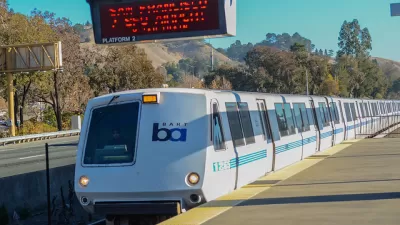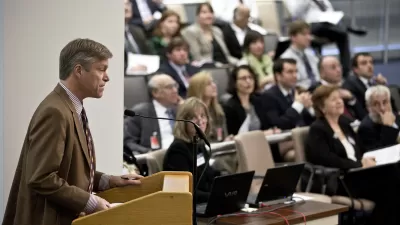For most planning programs in the U.S. this is the end of the semester. Having read literally hundreds of papers over the past few months I have reflected on the lessons of better papers for writing in planning.
For most planning programs in the U.S. this is the end of the semester. Having read literally hundreds of papers over the past few months I have reflected on the lessons of better papers for writing in planning.
- Find the right level of ambition. Papers or reports that are too ambitious risk seeming unfocused and shallow. On the other hand papers (or planning reports) lacking ambition-perhaps describing a place through one fairly standard lens-may just not say enough of interest to do really well.
- Make an argument that someone else will care about. A simple description of a standard phenomenon can demonstrate that you have some knowledge of a topic but a better paper convinces the reader that this matters to them or to the world.
- Make an argument that hangs together. Try diagramming your argument-your claim, evidence, qualifications, and so on. If you can't diagram it, you may not have much of an argument. My favorite book on writing papers-Booth et al.'s (2008) the Craft of Research-has great tips.
- Demonstrate that you understand your sources. As a planner you are typically writing for experts-other professionals, council members who know their constituencies, residents who know their neighborhoods. Using sources selectively to support opinions you merely mean to illustrate, rather than argue for, will undermine your credibility. Failing to show an understanding of which studies and datasets can support which kinds of claims will get you in similar hot water. Show you know when an oral history is great evidence and when you need a cost-benefit study.
- Use multiple data sources where possible. Making a coherent argument from statistics, observations, maps, interviews, and historical information is tricky but is likely to be a better argument than one based on a single source. Incidentally some people find certain data sources more convincing than others and you are more likely to hit on one of these sources if you use several.
- Get key technical terms right. Don't mix up the Athens Charter and the Charter of the New Urbanism-there are commonalities but experts in urban design know the difference.
This is my April blog quite late.

Maui's Vacation Rental Debate Turns Ugly
Verbal attacks, misinformation campaigns and fistfights plague a high-stakes debate to convert thousands of vacation rentals into long-term housing.

Planetizen Federal Action Tracker
A weekly monitor of how Trump’s orders and actions are impacting planners and planning in America.

San Francisco Suspends Traffic Calming Amidst Record Deaths
Citing “a challenging fiscal landscape,” the city will cease the program on the heels of 42 traffic deaths, including 24 pedestrians.

Defunct Pittsburgh Power Plant to Become Residential Tower
A decommissioned steam heat plant will be redeveloped into almost 100 affordable housing units.

Trump Prompts Restructuring of Transportation Research Board in “Unprecedented Overreach”
The TRB has eliminated more than half of its committees including those focused on climate, equity, and cities.

Amtrak Rolls Out New Orleans to Alabama “Mardi Gras” Train
The new service will operate morning and evening departures between Mobile and New Orleans.
Urban Design for Planners 1: Software Tools
This six-course series explores essential urban design concepts using open source software and equips planners with the tools they need to participate fully in the urban design process.
Planning for Universal Design
Learn the tools for implementing Universal Design in planning regulations.
Heyer Gruel & Associates PA
JM Goldson LLC
Custer County Colorado
City of Camden Redevelopment Agency
City of Astoria
Transportation Research & Education Center (TREC) at Portland State University
Jefferson Parish Government
Camden Redevelopment Agency
City of Claremont






























